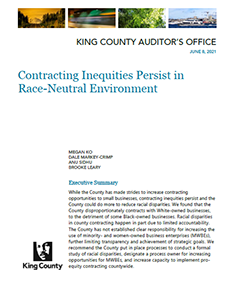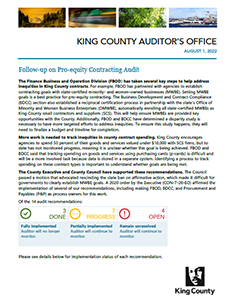Contracting Inequities Persist in Race-Neutral Environment
June 8, 2021
NEW! Download the latest follow-up report
While the County has made strides to increase contracting opportunities to small businesses, contracting inequities persist and the County could do more to reduce racial disparities. We found that the County disproportionately contracts with White-owned businesses, to the detriment of some Black-owned businesses. Racial disparities in county contracting happen in part due to limited accountability. The County has not established clear responsibility for increasing the use of minority- and women-owned business enterprises (MWBEs), further limiting transparency and achievement of strategic goals. We recommend the County put in place processes to conduct a formal study of racial disparities, designate a process owner for increasing opportunities for MWBEs, and increase capacity to implement pro-equity contracting countywide.
Watch the presentation (15:50)
Status
Of the 14 recommendations:
| DONE | 7 | Recommendations have been fully implemented. Auditor will no longer monitor. |
|---|---|---|
| PROGRESS | 7 | Recommendations are in progress or partially implemented. Auditor will continue to monitor. |
| OPEN | 0 | Recommendations remain unresolved. Auditor will continue to monitor. |
| CLOSED | 0 | Recommendation is no longer applicable. Auditor will no longer monitor. |
Summary
King County disproportionately contracted with White-owned small businesses while under-contracting with Black-owned and Latinx/Hispanic-owned small businesses. After state law banned race-based preferential treatment in contracting in 1998, the County started its Small Contractor and Supplier (SCS) program, a race-neutral initiative focused on small businesses. County agencies have worked to increase outreach to minority- and women-owned business enterprises (MWBEs), but the County has not done a disparity study that could lead to more targeted efforts.
MWBEs and small businesses face several roadblocks to public contracting, such as complicated processes, excessive evaluation criteria, and high insurance costs. County agencies have taken steps to remove these barriers, but actions have been siloed, reducing consistency and impact. There is no clear accountability structure for increasing opportunities for MWBEs and few specific, measurable countywide goals for spending with these firms. This framework does not effectively support the pro-equity contracting goals established in the County’s Equity and Social Justice Strategic Plan.
The SCS program increased county contracting opportunities with small businesses, investing more than $47 million in these businesses annually since 2014. However, without early monitoring and enforcement, prime contractors may have cost small subcontractors up to $1.9 million over three years by not meeting SCS requirements. Moreover, the poor data reliability of the SCS directory may reduce the effectiveness of the small business program.
Reports related to this audit
Currently, there are no related reports to this project.
Audit team
Megan Ko, Dale Markey-Crimp, Anu Sidhu, and Brooke Leary worked on this audit. If you have any questions or would like more information, please call the King County Auditor's Office at 206-477-1033 or contact us by email at KCAO@kingcounty.gov.

 Translate
Translate


